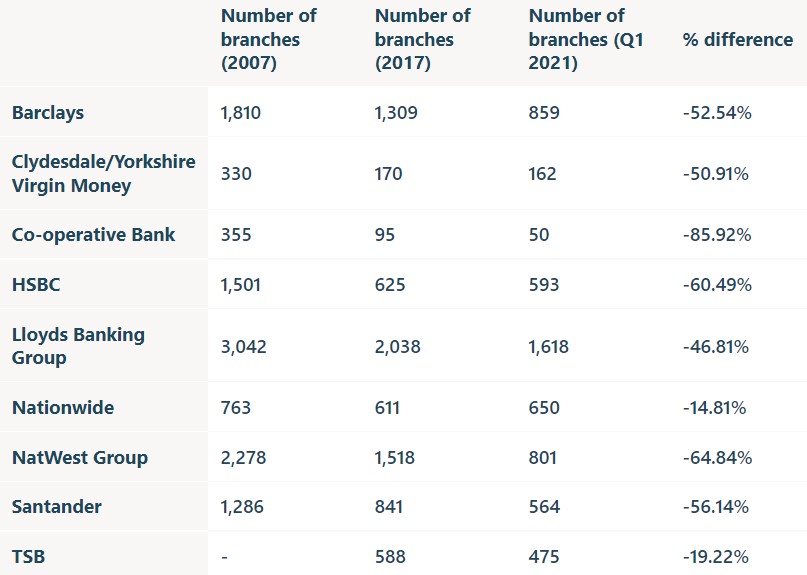
I found it interesting to post that Société Générale is launching a new retail bank in France …
“By 2025, the merged entity hopes to have 25,000 staff and operate 1,450 branches”
… at the same time as another headline announces that bank branches are needed now more than ever …
“The most popular reason for turning to brick-and-mortar branches was to meet bank managers; 38% of the consumers asked were hoping to discuss their finances, the research [from KPMG] showed.”
The argument for and against bank branches has raged for over a decade, and will rage on, but my bottom-line is that they are necessary. Why? Because it is a security and psychological blanket.
Branches are not necessary but they provide a security blanket for customers to feel that their money is safe. More than this, the fact that the building is there provides a psychological blanket. You don’t need to go the branch. You don’t need to see someone. But the fact that you know they are there if you need them provides a security and psychological blanket.
You may refute this and say that it is stupid, but it has been borne out time and time again through research and results. By way of example, I always remember the digital bank Che! in Italy is a digital-first bank that was opening branches. When I asked why, the answer was marketing. It’s not about advice or service or transactions. Branches are no longer required for cash and check deposits. They are there for is a security and psychological blanket. More than this, they have an important role in trade, finance, commerce and society. People want to know their bank is available but, more relevant in today’s world, is that they are their for small businesses to provide service.
If all small businesses move to contactless payments, that may change but, whilst small businesses take cash and coins, they need a branch to visit.
The thing is that a branch to visit as a security and psychological blanket is all well and good if it is affordable but, when few people visit, it’s not worth it.
A fifth (20%) of people have not visited a bank branch since before the Covid-19 pandemic, a survey has found.
There are many branches that have not been visited for months, and a large number who receive less than twenty customer visits per day. If you have two staff in a branch with less than twenty customers, the overheads are huge and returns minimal. Therefore yes, finally, many banks have closed many branches.
HSBC to close 114 banks in 2023
But the essence of where I believe the future lies is not in having huge numbers of branches or zero branches. It’s having enough places for customers to visit to deal with their need for a security and psychological blanket.
Back in the 1990s, I proposed the idea that UK banks needed 80 percent less branches. No-one listened. Today, we have around 6,000 bank branches. In 2000, there were 17,000. The world is changing.
Source: Choose
But note this: there are still bank branches. Why? Because customers need a place to see the money, see the people and see the balance. This is the core of why I said, thirty years ago, we need to get rid of branch surplus. We need to get rid of bank branches for transactional needs and improve the branch to service needs. We need branches for presence, branding, marketing and trust. No one needs a branch for cash or cheques anymore.
In other words, the key is that we need 80 percent less branches and the ones that remain are for that security and psychological blanket. It’s a warm place ot feel warm about money. It’s a place to eyeball someone and know that they can show you the money. Without that, the bank is pretty redundant as all the rest is an app.
Chris M Skinner
Chris Skinner is best known as an independent commentator on the financial markets through his blog, TheFinanser.com, as author of the bestselling book Digital Bank, and Chair of the European networking forum the Financial Services Club. He has been voted one of the most influential people in banking by The Financial Brand (as well as one of the best blogs), a FinTech Titan (Next Bank), one of the Fintech Leaders you need to follow (City AM, Deluxe and Jax Finance), as well as one of the Top 40 most influential people in financial technology by the Wall Street Journal's Financial News. To learn more click here...


